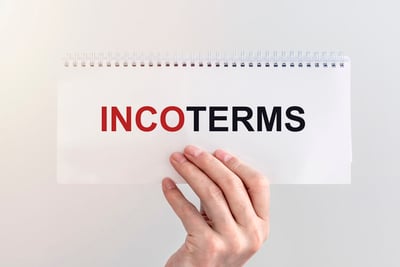Incoterms – Providing clarity in International Trade
What are Incoterms?
Incoterms (full name: international commercial terms) are standard sets of terms and conditions designed to assist traders when goods are sold and transported. Published by the International Chamber of Commerce, they are intended to clearly communicate the costs and risks associated with the transportation and delivery of goods. The Incoterms rules are used by buyers and sellers worldwide for the interpretation of the most commonly used terms in international trade.
The current version of Incoterms is Incoterms 2010. The 11 rules are divided into two groups: Seven are applicable to any method of transport, and four apply to trade that solely involves transportation by water (in general, used only for bulk cargos - such as oil and coal - and non-containerised goods).

How are Incoterms used?
Each three-letter Incoterms rule specifies:
- the obligations of each party (e.g. who is responsible for services such as transport, import and export clearance, etc.), and
- the point in the journey where risk transfers from the seller to the buyer.
So, by agreeing on an Incoterms rule and incorporating it into the sales contract, the buyer and seller can achieve a precise understanding of what each party is obliged to do, and where responsibility lies in event of loss, damage or other mishap.
Because they may relate to the parties’ legal requirements and responsibilities, if included in a contract of sale, it is important to be as specific as possible when using Incoterms.
Show me some Incoterms!
Some of the most common Incoterms are:
EX Works (EXW)
Selected when the buyer wants to hold responsibility for all costs and risks from the time the shipment is picked up from the seller’s location. EXW can be used with all modes of transport. This Incoterm is more appropriate for domestic trade; it is not recommended for international trade as it places responsibility for export customs clearance with the buyer.
Free Carrier (FCA)
Places responsibility for costs and risks with the buyer when the goods are delivered to the first carrier, typically the freight forwarder, at the seller’s premises or another named place. FCA can be used with all modes of transport and is appropriate for containerized shipments.
Free on Board (FOB)
This Incoterm is recommended for marine shipments only, and is appropriate for bulk shipments. One of the most commonly used, and misused, Incoterms, it is often used inappropriately for shipments in ocean containers. FOB transfers cost and risk to the buyer when the goods are loaded on board the vessel nominated by the buyer.
Carriage and Insurance Paid To (CIP)
This Incoterm places responsibility for selecting the carrier, and paying transport costs to a named destination point, with the seller. It is important to note however that the buyer still holds responsibility for risk of loss when the goods are picked up from the seller by the seller’s carrier or freight forwarder. CIP enables the buyer to obtain cargo insurance from the seller (at the seller’s expense), can be used with all modes of transport, and is appropriate for containerized shipments.
Delivered Duty Paid (DDP)
This Incoterm places responsibility for all costs and risks with the seller up to a named point of destination. It can be used with all modes of transport and is appropriate for containerized shipments, but is not recommended as it places responsibility for import customs clearance with the seller.
How can I make the best use of Incoterms?
- Familiarize yourself with all 11 terms included in Incoterms 2010.
- Discuss selection of the appropriate Incoterm with your international vendor or customer prior to finalizing the sale of goods.
- Select an Incoterm that is appropriate for the mode of transport, particularly when goods are shipped in ocean containers (this mode of shipping uses the seven rules applicable to all modes of shipping, not those for marine shipments).
- Consider using a Contract of Sale to reduce the potential for liabilities and risks not covered by Incoterms.
- Obtain a copy of the Incoterms 2010 Guide from the International Chamber of Commerce or any major bookseller.
We can help
International trade is complicated and the potential costs and risks involved can be substantial. If the Incoterms rules are not applied correctly, disagreements and even litigation can result, leading to shipment delays and costs that can impact your bottom line and damage international trading relationships.
Correctly used, Incoterms help increase clarity and certainty. Our Freight Consultants are well versed in the use of Incoterms and can help buyers and sellers select the appropriate Incoterms for their contracts, as well as provide guidance on other aspects of international trade. For detailed information, contact your Logistics Coordinator. For more general information, contact us today to discuss the best way to ensure the safe shipment of your goods.
Information provided by: Supply Chain Consultant - Cole International

